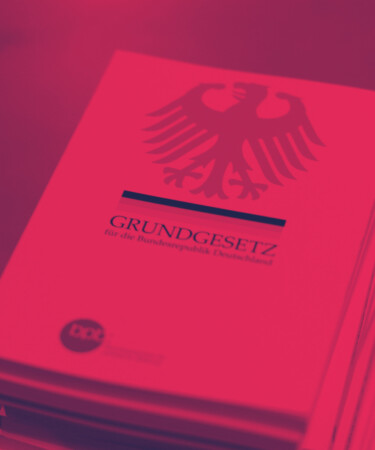
Wiretapping of the Last Generation violates freedom of the press
Jointly with Reporters Without Borders and three journalists we go to court against the wiretapping of the Last Generation press phone. The law enforcement authorities deliberately took the risk of intercepting confidential journalistic conversations - a violation of press freedom.
FREEDOM OF THE PRESS BEFORE THE FEDERAL CONSTITUTIONAL COURT
In September 2024, together with Reporters Without Borders and two journalists, the GFF filed a constitutional complaint against the secret wiretapping of the Last Generation protest group's press phone. The complainants are two journalists affected by the wiretapping, Jörg Poppendieck (rbb) and Jan Heidtmann (SZ). The aim of the constitutional complaint is to ask the Federal Constitutional Court to clarify the fundamental rights limits for the tapping of press telephones and to create legal certainty for journalists. It also deals with the question of whether investigating judges must explicitly include fundamental rights considerations in the decision when ordering investigative measures or can only state the reasons afterwards.
“When the government systematically intercepts conversations between the press and political groups, it seriously interferes with the freedom of the press. If the group's actions are as public as those of the Last Generation, this interference is unnecessary and disproportionate: there is nothing that would not be known anyway”, emphasizes Benjamin Lück, lawyer and case coordinator at the GFF. “Journalists must also be able to freely research and report on controversial forms of protest at the limits of legality.” The constitutional complaint criticizes the fact that the Munich District Court did not include any consideration of fundamental rights in the surveillance order and did not mention the freedom of the press at all, even though it was foreseeable that a large number of journalists would call the wiretapped connection. Now the Federal Constitutional Court must decide.
MUNICH DISTRICT COURT: MEASURE IS LAWFUL
Together with the three journalists Ronen Steinke (SZ), Henrik Rampe (frei) and Jörg Poppendieck (rbb), we went to the Munich District Court. They had all been in contact with the Last Generation via the press telephone and were affected by the wiretapping.
Ronen Steinke, legal policy correspondent of the Süddeutsche Zeitung, emphasises: "Wiretapping journalists' conversations, uninterruptedly, for months, and keeping those wiretapped in the dark about it afterwards - such an encroachment by the state undermines the freedom of the press. Confidential conversations are essential for independent journalism."
"These three cases are just the tip of the iceberg. Given the media presence of Last Generation during the surveillance period, the number of media professionals potentially affected is incalculably large," RSF Executive Director Christian Mihr affirms. After inspecting the files on the wiretapping measure, we withdrew the application on behalf of the two applicants Ronen Steinke and Henrik Rampe and filed a further application for a review of the measure on behalf of Jan Heidtmann, also a journalist at Süddeutsche Zeitung. This was rejected by the District Court in November 2023.
COMPLAINT AT THE MUNICH REGIONAL COURT
Together with RSF and the two journalists Jörg Poppendieck (rbb) and Jan Heidtmann (SZ), we have lodged an appeal against the decisions of the Munich Local Court. Now the Munich Regional Court must decide. The local court recognised the wiretapping measures of the Munich Public Prosecutor General's Office against the press telephone of the 'Last Generation' as lawful.
This interference with press freedom was sufficiently justified, says the Munich District Court. The GFF and RSF see the decisions as a clear violation of press freedom, as the court did not even mention the fundamental right in the original surveillance order.
In its ruling of August 2024, the Munich I Regional Court described the measure as a "profound interference" with press freedom. Nevertheless, it considers the surveillance to be proportionate and thus dismissed the complaint. GFF and RSF are now considering further legal action against these decisions.
ALLEGATION OF FORMING A "CRIMINAL ASSOCIATION"
Behind the wiretapping of the press telephone is the investigation against members of the Last Generation on charges of forming a "criminal organisation". According to the Süddeutsche Zeitung, from October 2022 to April 2023, investigators intercepted calls from a total of 13 telephone connections, including the organisation's press telephone. In fact, the majority of calls received were from members of the media. Nevertheless, the authorities took this far-reaching, secretive investigative measure and thus endangered the freedom of the press. This shows the far-reaching social consequences of simply starting an investigation on the accusation of "criminal association".
The tapping of the press telephone is further evidence of the repressive approach of the security authorities in the context of climate protests. The limits of the rule of law and fundamental rights are deliberately transgressed time and again. The proceedings of RSF and GFF aim to have the fundamental rights limits for tapping the press phones of such organisations clarified by the courts and to create legal certainty for journalists. The applicants are represented by lawyer Nicola Bier.





